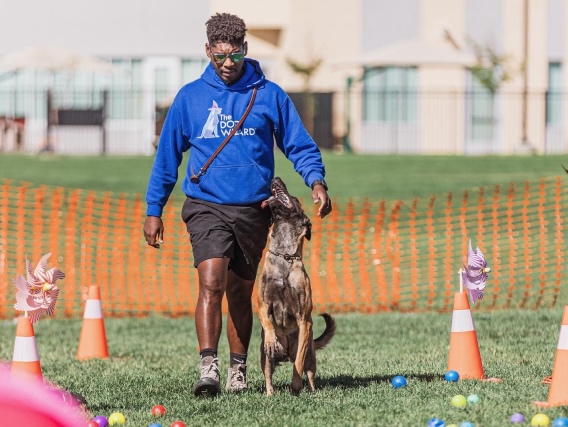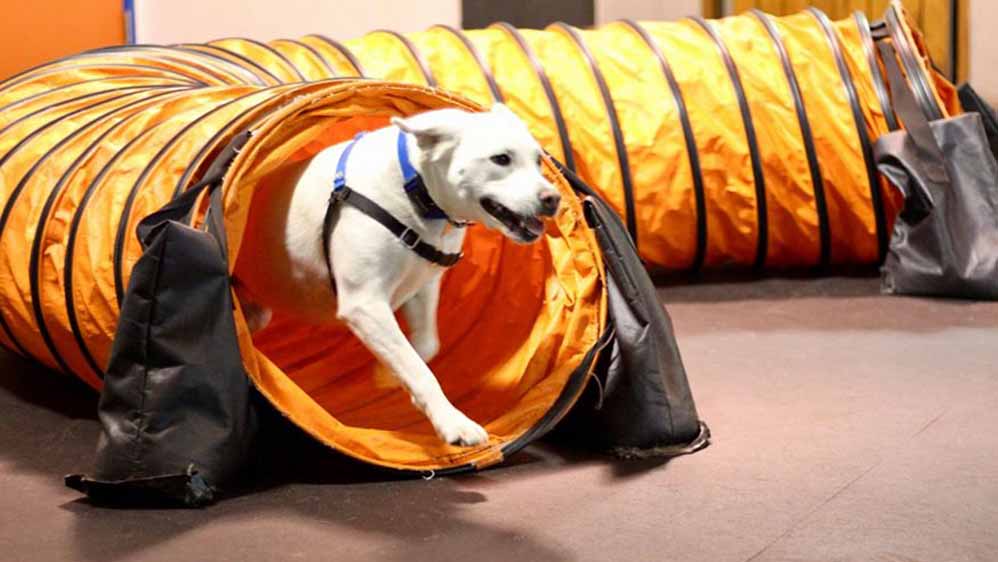Discover Top Tips for Dog Training Charlotte NC That Actually Job
Discover Top Tips for Dog Training Charlotte NC That Actually Job
Blog Article
Unlock Your Pet dog's Prospective: Proven Pet Dog Training Methods for Success
Reliable pet dog training is a nuanced process that pivots on recognizing canine actions and employing medically backed strategies. By including positive reinforcement, developing clear commands, and focusing on socialization, pet owners can grow an effective relationship with their pets.
Comprehending Canine Actions
Comprehending pet behavior is necessary for efficient training and promoting a favorable connection in between canines and their proprietors. An extensive understanding of canine body movement, vocalizations, and social communications is essential for identifying their needs and feelings. Dogs interact largely through non-verbal hints; for instance, a wagging tail may show excitement, while pinned ears can indicate anxiety or submission.

Moreover, environmental factors play a significant duty in shaping a dog's behavior. Adjustments in regular, brand-new surroundings, or the existence of unfamiliar individuals can bring about stress and anxiety or anxiety in pets. Identifying these triggers allows owners to mitigate damaging responses and establish appropriate training strategies.
Inevitably, a deep understanding of pet habits lays the foundation for effective training approaches, boosting both habits and the overall bond between the dog and its owner. dog training charlotte nc. This knowledge is essential for cultivating a well-adjusted, delighted canine friend
Favorable Reinforcement Techniques
Efficient training relies heavily on positive reinforcement methods, which have been revealed to produce substantial cause forming desired actions in canines. This strategy includes compensating a pet dog for exhibiting certain behaviors, consequently enhancing the likelihood that these habits will certainly be repeated. Incentives can take various types, consisting of deals with, praise, playthings, or playtime, depending upon what encourages the individual pet dog.

It is important to progressively terminate benefits as the dog finds out the habits, transitioning to recurring support. This technique maintains the actions gradually while avoiding dependence on continuous rewards. By concentrating on positive support, instructors can grow a relying on partnership with their pets, advertising a cooperative and healthy training environment that improves total obedience and performance.
Establishing Constant Commands
An essential facet of successful canine training is the establishment of regular commands. Consistency in commands is critical for efficient interaction between the instructor and the canine. When commands are uniform, pets learn to link specific words with preferred actions, which speeds up the training procedure and enhances understanding.
To establish regular commands, it is important that all household participants utilize the very same terms and gestures. If one person utilizes "rest" while an additional says "sit down," it can produce complication for the canine. Select clear, distinctive words for commands and guarantee everybody entailed in the dog's training complies with these options.
Furthermore, rep is key. Strengthen commands with frequent method, making sure that the pet receives sufficient chances to respond properly. When a pet dog efficiently adheres to a command, prompt favorable support ought to comply with. This might be in the kind of deals with, appreciation, or play, strengthening the connection between the command and the activity.
Finally, be person. Establishing regular commands requires time and psychiatric dog training effort. With dedication and clarity, you will certainly assist your dog create a strong understanding of assumptions, ultimately bring about a mannerly buddy.
Socialization and Direct Exposure
Mingling a dog is essential for cultivating a confident and well-adjusted companion. This procedure involves revealing your pet to a range of environments, individuals, and other animals to establish their social skills and flexibility. Early socializing, ideally in between the ages of three to fourteen weeks, is essential, as it lays the groundwork for a pet's future habits.
Throughout socialization, aim to supply positive experiences in various settings, such as parks, active streets, and homes with other pet dogs. Introduce your pet to different stimulations, including audios, sights, and scents, guaranteeing that each experience is gratifying. This exposure aids reduce anxiety and anxiety, leading the way for a much more resistant canine.
Involving in controlled group play sessions with other canines can likewise boost social abilities, educating your pet ideal communications and borders. Focusing on socializing will dramatically add to your dog's general joy and check over here habits throughout their life.
Overcoming Common Training Difficulties

One more constant problem is interruption. Pets may websites struggle to focus in strange or hectic setups. Gradually desensitize your pet to disturbances by starting training in a peaceful setting and slowly presenting even more stimuli as they come to be skilled (Dog training). Positive reinforcement methods, such as treats and appreciation, can maintain motivation and emphasis.
Furthermore, behavior concerns like leaping or too much barking can become aggravating. Address these by instructing alternate habits, such as resting steadly when welcoming visitors. Uniformity and perseverance are crucial; reinforce desired behaviors regularly and avoid scolding, which can result in complication.
Lastly, acknowledge that each pet is unique, and training timelines may differ. Dressmaker your strategy to your pet's specific demands, and look for expert assistance if essential. With perseverance and the best techniques, conquering these challenges can lead to a trained, satisfied canine friend.
Verdict
In final thought, unlocking a canine's potential necessitates a thorough strategy that includes an understanding of canine habits, the application of positive reinforcement strategies, and the facility of consistent commands. Early socialization and direct exposure to diverse atmospheres better boost a pet's flexibility and confidence. By addressing usual training difficulties with tailored approaches and persistence, a harmonious and participating connection between pet and trainer can be promoted, ultimately leading to a well-behaved buddy efficient in growing in various scenarios.
Reliable pet training is a nuanced procedure that pivots on understanding canine habits and employing clinically backed strategies.Comprehending dog behavior is essential for efficient training and fostering a positive partnership between pet dogs and their proprietors.Efficient training counts heavily on positive support techniques, which have been revealed to yield substantial outcomes in shaping preferred actions in canines. When commands are consistent, pets learn to connect details words with desired habits, which increases the training procedure and enhances understanding.
In final thought, opening a dog's potential requires a thorough approach that integrates an understanding of canine actions, the application of favorable support techniques, and the establishment of constant commands.
Report this page